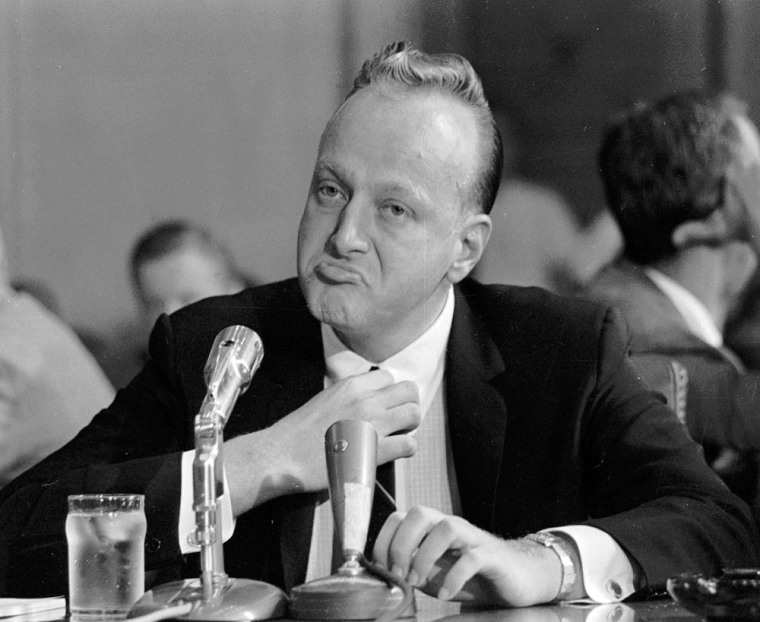Frank "Lefty" Rosenthal — sports handicapper extraordinaire, Las Vegas gaming executive and the inspiration for the blockbuster movie "Casino" — died Monday. He was 79.
He died from a heart attack in his Miami Beach condo, a fire-rescue spokeswoman said.
Rosenthal, who once survived a car bomb, ran the Chicago mob-owned Stardust, Fremont, Hacienda and Marina casinos through the 1970s and into the mid-1980s. Although Sports Illustrated once crowned him as the greatest living expert on sports handicapping, Rosenthal eventually wound up being listed in Nevada's "black book" of unsavory types banned from the state's casinos because of his ties with the Mafia.
"He's one of the originals," said Nick Pileggi, the author and screenwriter of "Casino." "When Lefty went down, the new Las Vegas emerged. The corporate Las Vegas."
Born in Chicago in 1929, Rosenthal learned the gambling trade through illegal bookmaking operations and made friends with Chicago mobsters — ties that would last a lifetime. In 1961, he appeared before a Senate hearing on gambling and organized crime during which he invoked Fifth Amendment protection against self-incrimination 38 times — and kept his left hand aloft throughout while doing so, thus garnering the nickname "Lefty."
Rosenthal's mafia ties may have also taken him beyond the realm of gambling; federal documents claimed that in the 1960s he was associated with a CIA-connected, Cuban-American anti-Castro militant named Luis Posada Carriles. Rosenthal and Carriles denied these claims.
A city in transition
In 1968, Rosenthal went to Las Vegas, presiding over a city in transition, from a Mafia-infused hotbed of sin to a sanitized, global entertainment Mecca.
"Lefty's era was the Las Vegas of the bloated Elvis and polyester suits," said Michael Green, a history professor at the College of Southern Nevada in Las Vegas.
Although Rosenthal ran four casinos, he didn't have a Nevada gaming license — a 1971 indictment in California for conspiracy in interstate transportation in aid of racketeering helped prevent him from obtaining one.
And his ties to organized crime, especially with reputed mobster Tony Spilotro, got him into hot water.
Spilotro was indicted in a skimming scheme, along with about 14 others, which also sealed Rosenthal's fate with gaming regulators, who ended up putting both men in Nevada's Black Book of persons excluded from casinos. Spilotro also had an affair with Rosenthal's estranged wife, Geri — one of the many dramatic moments of Rosenthal's life that played out in the movie, "Casino."
"Lefty was the ultimate handicapper," said Pileggi. "But he couldn't handicap his heart. His marriage ended in disaster."
Green said Rosenthal was pushed out in the late 1970s and early 1980s when Las Vegas began to shed its image of being under the control of organized crime. The transformation became complete years later, with the emergence of corporate gambling interests.
Cadillac goes up in flames
On Oct. 4, 1982, Rosenthal turned the key in his Cadillac and ignited a fiery explosion that ruined the car but didn't kill him. The case was never solved.
Rosenthal left Las Vegas soon after and eventually landed in South Florida, where he ran a sports betting Web site and served as a consultant for offshore online casinos.
Despite his mafia ties, shady bookmaking allegations and game-fixing probes, he had few brushes with the law.
"I don't believe he ever spent a day in jail while I was representing him," said Las Vegas Mayor and former Rosenthal attorney Oscar Goodman. "There were plenty of people who were shooting for him, and I'm sure if you ask law enforcement they didn't care for him."
"But he always treated me with respect and dignity, and he paid his bills on time," he said.
Last year, Rosenthal explained to the Miami Herald what it takes to be a better gambler.
"No secrets to a winning formula," he said. "It takes years, perhaps more to establish a rigid form of self discipline. You must also be prepared to accept a lifestyle that requires an aspect of personal sacrifice, and bumpy roads along the way."
